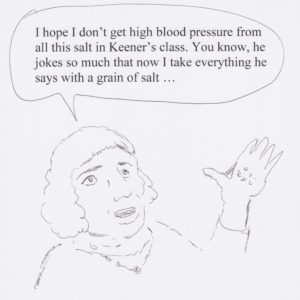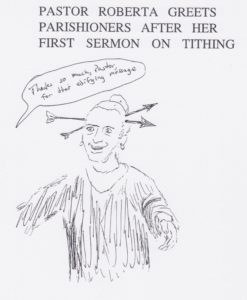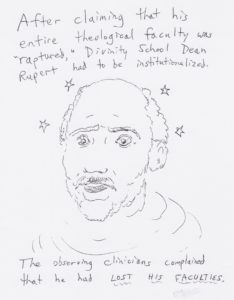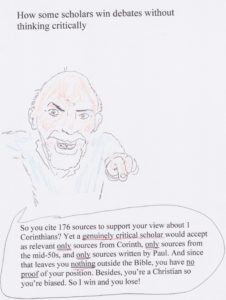They take Keener with a grain of salt
Acts 13-15: 1st missionary journey, Jerusalem Council
Free video lecture 15
1-hour free video lecture on Acts 13-15
Revelation on sale at Logos
Just a brief note for anyone who might be interested: the NIVAC: New Testament set is 44% off right now at Logos Bible Software? http://bit.ly/2nknsuE The set includes my commentary on Revelation. The deal ends April 3.
Sin damages relationships, but forgiveness can restore them—Genesis 50:15-21
Sometimes it feels difficult to trust forgiveness if we know that we have damaged our relationship with someone.
Although Joseph’s brothers have changed, consequences of their past actions remain. Conscious of the harm that they did to Joseph, they are afraid to trust him, suspecting that he has spared them only for his father’s sake (50:15). (Their term for bearing a grudge applies earlier in Genesis to Esau’s hatred of his brother Jacob for what Jacob had done to him; 27:41. Their language of repaying evil might recall Joseph’s earlier accusation in 44:5 that they had repaid evil for good, though that accusation was fictitious. It probably simply recalls their earlier action of evil, falsely attributed in 39:9 to an animal.)
Thus they fall before his face before Joseph (50:18) again (cf. 37:9-10; 42:6; 43:26, 28), only this time fully knowing his identity. They wrongly sold him into slavery; now they offer themselves to be his slaves (50:18).
Joseph, by contrast, the narrative’s more “reliable” character, has a better approach because he considers the divine perspective: without their behavior, he would not be vizier of Egypt. Apart from their action, he could not have saved their lives and the lives of others (50:20). It was all part of God’s plan.
God’s larger purpose does not excuse their guilt—that God works through human choices does not absolve humans of responsibility—but it does make their action ultimately inconsequential in the larger scheme of things. When we are tested, it is helpful to keep our focus not on human mistreatment of us, when we cannot change it, but on what we can learn from God and how we can carry out his will in the face of such situations. (Of course this does not mean that we neglect injustice when there is something we can do about it. Joseph’s only available recourse had been to cry out [42:21], but had he been able to prevent his enslavement he surely would have done so.)
Joseph comforts them (50:21), though the same term applies to their inability to comfort Jacob after they had disposed of Joseph (37:35). Far from seeking to return harm to them, Joseph promises to continue to provide for them and their children (50:21). After all, God raised him up for the purpose of keeping many alive (50:20; cf. 45:5), certainly including them (cf. 45:7). Whereas they had wanted to kill (37:20), God raised up Joseph to preserve life (45:5; 50:20); whereas they had done harm, Joseph returns to them good for evil.
As a reliable character, Joseph’s positive role model points the way toward the one who would ultimately epitomize returning good for evil and life for death to his people and others, namely Jesus. Indeed, the Joseph narrative shows us a frequent pattern in God’s way of working through weakness and suffering before exaltation. Just as God showed his longer-range plan by proving Joseph to be alive after his father assumed him dead, so more fully God would show his longer-range plan by raising Jesus from the dead. The God of the Joseph narrative is also the God and Father of Jesus Christ.
Preaching stewardship
Acts 12-13: God strikes Herod; Paul’s mission begins
Free video lecture 14
1-hour free video lecture on Acts 12-13. The material summarizes much material from Craig’s 4-volume Acts commentary (Baker Academic, 2012-2015).
Buried in Faith—Genesis 50:1-14
The story of Jacob’s burial, like the story of him blessing his sons regarding the future, is a story of faith. The story of his faith and Joseph’s faith, initially just following God’s leading in their own lives and at God’s initiative, ends up impacting the world around them.
Jacob knows that God will bless his descendants and return them to the promised land (48:21), for God had told him so (46:4). Jacob’s desire to be buried in the promised land (49:29) is thus an act of faith in that promised future (cf. comparable faith in Heb 11:21-22). So significant is his last request that despite the already extensive period mourning for Jacob in Egypt (Gen 50:3), Joseph receives permission to ensure Jacob’s burial in the requested place (50:4-13).
Pharaoh of course grants Joseph a leave of absence to bury his father, recognizing the importance of both filial duty and the duty to which Joseph’s oath to Jacob committed Joseph (50:6). But Pharaoh, who has special regard for his trustworthy right-hand man, does more than than merely grant him permission to take off work for a funeral. Joseph had probably anticipated this, based on his special relationship with this Pharaoh. (Pharaoh regularly lavished favor on Joseph, e.g., 41:41-45; 45:17-20; 47:6-7; whether or not the same Pharaoh is in view here—the Pharaoh’s particular identity does not seem to concern the narrator or his sources—Joseph may ask indirectly [50:4] to avoid dishonorably seeming to directly request too many favors [cf. 46:33-34].)
Many of Egypt’s leaders undertook this journey as well, to honor the holy father of the land’s esteemed wise voice for God, Joseph (50:7; cf. 47:9-10). So great was their mourning for the patriarch that even the local Canaanites took notice (50:11).
Through a man who persevered in serving God through suffering, and most of all through God’s plan for him and for others, God had impacted a nation for a generation. No such impact is permanent—eventually a king arose who did not know Joseph (Exod 1:8; some scholars associate this change with the historical transition from the Hyksos dynasty to those who overthrew it). But making a difference for even one generation makes an eternal difference for the people of that generation. Often God has used just a few people to make a huge difference—for example, consider the impact of three figures from Oxford’s Holy Club (Whitefield and the Wesley brothers) in eighteenth century England and its American colonies. Joseph’s calling didn’t look like any of our traditional ideas of ministry, but he was faithful in hearing God and doing his will. Let us each be faithful to the calling God has given us.
It is not surprising that Israel’s family left their little ones and livestock in Egypt (50:8), since in the short run they planned to return (50:14). The narrator includes this information to notify us that all the other members of the household went to honor their deceased patriarch Jacob (Gen 50:8)—but also because it provides a fitting contrast with a story to come. Generations later Moses will refuse to leave the little ones and livestock behind (Exod 10:9-11) precisely because, as is obvious to that generation’s Pharaoh, Moses does not intend to return.
That “his sons did for him as he had commanded them” (50:12) and carried his body (50:13) was of course honorable filial behavior (cf. Jacob’s obedience to his parents in 27:8; 28:6). Yet it contrasts with the disobedience shown by his sons in earlier years—even to the point of a firstborn defiling their father’s bed (35:22) and most of the others selling his favorite son into slavery (37:26-28).
This new obedience illustrates how God’s grace in a family can bring change, even when that change appears imperceptible in the short term. We may also note that most of the commanding in surrounding chapters has been done by Joseph (42:25; 44:1; 50:2, where his servants include even physicians/embalmers; cf. Pharaoh on Joseph’s behalf in 45:19; 47:11). Now, however, at the end, Joseph’s father who first instilled in Joseph the ways of God is still honored by all his sons, including the one who became Pharaoh’s vizier (Jacob’s command in 49:29, 33; 50:12).
The narrator further reminds his Israelite audience of the burial place in Canaan that Abraham had bought from a Hittite (50:13). Like Shechem (33:19), this was a foothold in the land paid for by their ancestors, footholds that belonged to them even before battles with Canaanites.
This narrative teaches us about faith, through the example of Jacob; about how God can sometimes impact entire cultures through those who live faithful to God; and how God changes families. It also reminds us that even when we do not recognize the foreshadowings in our lives, God is faithful to his long-range promises to us and to his people.





